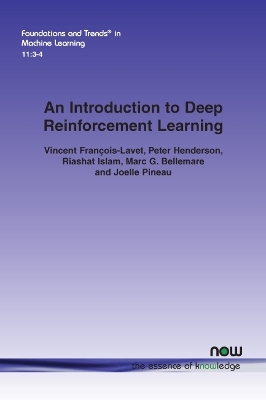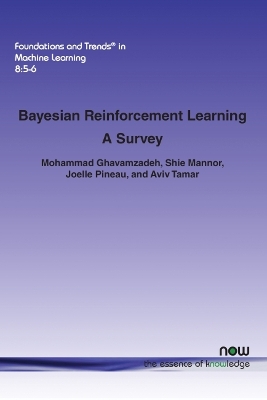Foundations and Trends (R) in Machine Learning
2 total works
An Introduction to Deep Reinforcement Learning
by Vincent Francois-Lavet, Peter Henderson, Riashat Islam, Marc G. Bellemare, and Joelle Pineau
Published 20 December 2018
Deep reinforcement learning is the combination of reinforcement learning (RL) and deep learning. This field of research has recently been able to solve a wide range of complex decision-making tasks that were previously out of reach for a machine. Deep RL opens up many new applications in domains such as healthcare, robotics, smart grids, finance, and many more.
This book provides the reader with a starting point for understanding the topic. Although written at a research level it provides a comprehensive and accessible introduction to deep reinforcement learning models, algorithms and techniques. Particular focus is on the aspects related to generalization and how deep RL can be used for practical applications. Written by recognized experts, this book is an important introduction to Deep Reinforcement Learning for practitioners, researchers and students alike.
This book provides the reader with a starting point for understanding the topic. Although written at a research level it provides a comprehensive and accessible introduction to deep reinforcement learning models, algorithms and techniques. Particular focus is on the aspects related to generalization and how deep RL can be used for practical applications. Written by recognized experts, this book is an important introduction to Deep Reinforcement Learning for practitioners, researchers and students alike.
Bayesian Reinforcement Learning
by Mohammed Ghavamzadeh, Shie Mannor, Joelle Pineau, and Aviv Tamar
Published 26 November 2015
Bayesian methods for machine learning have been widely investigated, yielding principled methods for incorporating prior information into inference algorithms. This monograph provides the reader with an in-depth review of the role of Bayesian methods for the reinforcement learning (RL) paradigm.
The major incentives for incorporating Bayesian reasoning in RL are that it provides an elegant approach to action-selection (exploration/exploitation) as a function of the uncertainty in learning, and it provides a machinery to incorporate prior knowledge into the algorithms.
Bayesian Reinforcement Learning first discusses models and methods for Bayesian inference in the simple single-step Bandit model. It then reviews the extensive recent literature on Bayesian methods for model-based RL, where prior information can be expressed on the parameters of the Markov model. It also presents Bayesian methods for model-free RL, where priors are expressed over the value function or policy class. It is a comprehensive reference for students and researchers with an interest in Bayesian RL algorithms and their theoretical and empirical properties.
The major incentives for incorporating Bayesian reasoning in RL are that it provides an elegant approach to action-selection (exploration/exploitation) as a function of the uncertainty in learning, and it provides a machinery to incorporate prior knowledge into the algorithms.
Bayesian Reinforcement Learning first discusses models and methods for Bayesian inference in the simple single-step Bandit model. It then reviews the extensive recent literature on Bayesian methods for model-based RL, where prior information can be expressed on the parameters of the Markov model. It also presents Bayesian methods for model-free RL, where priors are expressed over the value function or policy class. It is a comprehensive reference for students and researchers with an interest in Bayesian RL algorithms and their theoretical and empirical properties.

